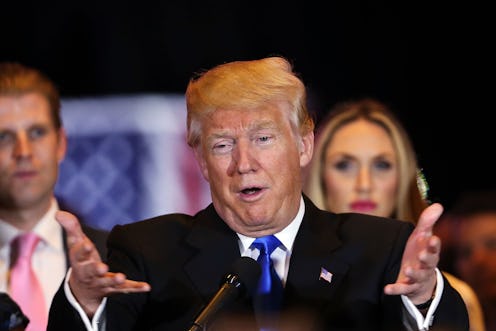News
Nothing Can Stop The Trump Train
The unimaginable has happened. Donald Trump has no true competitor in the race for the GOP nomination. Think back to last year. Did your family write him off then, too? At Fourth of July, Thanksgiving, or Christmas, did you think the party would elect him? He's against the main tenets of GOP economic policy, social policy, and foreign policy. He's against free trade, can't decide on abortion, and is anti-interventionist. And yet he's winning the delegates and has toppled the campaigns of 10-plus party insiders. At this point, can the GOP stop Donald Trump from being its presidential nominee?
Never say never, but the short answer is "No." At this point, Trump is only 229 delegates away from the nomination. He picked up at least 51 on Tuesday, bringing him to 1,008 (and when the vote tally is finalized, he could pick up a few more). The total need to clinch the nomination is 1,237. There are 445 delegates remaining to be pledged. Trump only has to win just over 51 percent of them, which now seems more within his grasp than ever. Nationwide, he's polling at just 45 percent, but no polls take into account Cruz's exit from the race. Trump will surely pick up some Cruz supporters.
This was confirmed in a poll released in March by Quinnipiac University. Despite the harsh words between the two candidates, about 56 percent of Cruz supporters would vote for the Donald as their second choice. The hypothetical the poll laid out is the exact situation we find ourselves in. With Cruz out of the race, would you go for Trump or John Kasich? The Ohio governor got just 25 percent, and Trump won every demographic, including women. So say that 56 percent of Cruz's voters do go for Trump. That would bring his support up to about 62 percent of likely GOP voters. That's huge.
So even if the delegates were allocated proportionally, he probably would have more than enough. But since this is the GOP we're talking about here, Trump should have an even easier time. Montana, New Jersey, and South Dakota are winner-take-all states. Trump will take home more than his fair share of their delegates. Those states alone would give him 107 of the 229 he needs. He really does seem to have this in the bag.
But let's say that for some unforeseen reason, Trump does not make it to 1,237 delegates and the convention is contested. There's still a good chance that he would win. Winning a contested convention was Cruz's game plan; he had been working hard to recruit pledged delegates to vote for him in subsequent rounds. Plus, he worked hard to get support in the states without presidential preference contests — their delegates were free to support any candidate. He also worked to elect pro-Cruz delegates in Pennsylvania. In the end, though, that support didn't materialize.
Some of those unbound delegates will surely vote for Trump, especially if his momentum continues — and the lack of a competitive opponent is a good sign that it will. Plus, if Cruz and Rubio release their delegates, as Ben Carson did with his two delegates in Nevada, some would surely go for Trump too, helping him win a contested convention.
When Trump enters the ring with more than 1,000 bound delegates, finagling the vote for another candidate would be extremely difficult — and it would be against the wishes of most Republican voters. Nearly six in 10 think that the candidate with the most primary votes should get the nomination.
So short of writing some very complicated, unfair rules for the convention, the GOP can't do anything. Trump is all but certain to win a contested convention. But it probably won't even come to that. At this point, he'll head to Cleveland with the delegates he needs already in the bag. That means it'll be up to the Democrats to beat him in November.
